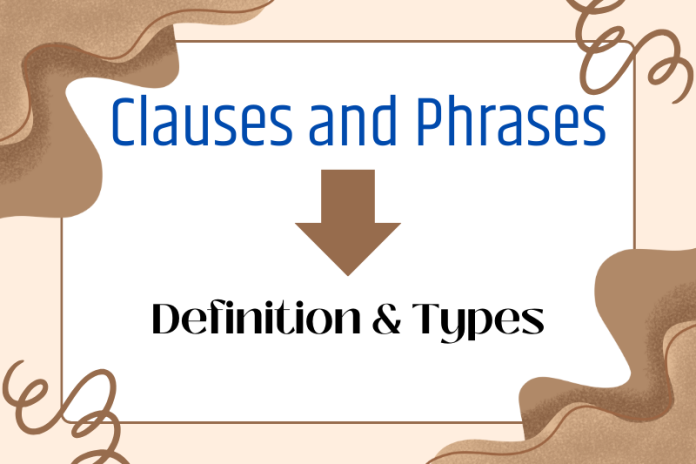Clauses and Phrases
Clauses and Phrases are the most important topics. A clause is a group of words having a Subject and Finite Verb either expressed or understood. A Phrase is a group of words without a subject and a finite verb but conveys a special meaning in the sentence. To form any phrase, at least there must be two words.
Clauses Classifications:
There are three kinds of Clauses-
- Principal/Independent Clause,
- Subordinate/Dependent Clause and
- Coordinate Clause.
- Principal/Independent Clause: The Clause that can independently express its meaning.
- Subordinate/Dependent Clause: The clause that depends on the Principal Clause to express its meaning.
- Coordinate Clause: When two or more than two of the same Clauses are combined by coordinating conjunctions like—-and, or, but, yet, still, etc.
Now, let us follow the examples.
- I shall help you if you come.
- When it rains, we shall not go out.
- He is poor but honest.
In Sentence [1] I shall help you—- independently express its meaning and this is a —–Principal Clause. The other part ——–if you come—-depends on the Principal Clause to express its meaning and hence, this is the Subordinate Clause.
In Sentence[2] When it rains——–cannot express its complete meaning and it depends on the other part. So, this is Subordinate and the other is the Principal Clause.
In Sentence [3] We can divide the whole sentence into two small sentences—–He is poor. He is honest. Both the sentences have been connected by—but. These are Coordinate Clauses.
The Subordinate/Dependent Clauses are again divided into three—-
- Noun Clause: The Clause that does the work of a Noun.
- Adjective/Relative Clause: The Clause that does the work of an Adjective.
- Adverbial Clause: The Clause that does the work of an Adverb.
A Noun Clause can be the–Subject, Object, Complement, or Object to a Preposition
Examples:
- Subject: What you say is not true.
- Subject: How he did it is known to me.
- Object: I know that he is honest.
- Complement: It seems to me that he is tired.
- Object to a Preposition: It depends on how you treat him.
An Adjective Clause usually qualifies a Noun or a Pronoun
Examples:
- The boy who stood first in the Admin Cadre is my younger brother.
- The boy whom you saw is my student.
- Those whom teachers love must succeed in life.
- The child which is crying is hungry.
- This is the same thing as you bought.
An Adverbial Clause does the functions of Adverbs in mentioning——time, place, cause and effect, manner, condition, purpose, etc.
- It was raining when I was reading.
- You may go wherever you like.
- As I am ill, I shall not go to college.
- If you read well, you will get GPA-5.
- Unless it rains, we will move.
The Phrases
Phrases are classified into twelve so far as we can see in uses:
- Noun Phrase;
- Adjective Phrase;
- Adverbial Phrase;
- Verbal Phrase/Phrasal Verbs;
- Prepositional Phrase;
- Conjunctional Phrase;
- Interjectional Phrase;
- Participle Phrase;
- Phrase in Apposition;
- Absolute Phrase;
- Infinitive Phrase &
- Parenthetical Phrase.
A Noun Phrase does the function of a Noun. It can be the Subject, Object, and Object-Complement of the Sentence.
Examples:
To walk is good for health. His passing in the exam is uncertain. He seems to be tired.
The bold and Italic words are Phrases
2. An Adjective Phrase does the function of an Adjective. It usually contains a qualifying word. Examples:
.He gifted my daughter a chain of gold. This is a bike made in Japan. The boy who secured the first position in the exam is my younger brother. The bold and italic words are Adjective Phrases
3. An Adverbial Phrase does the function of an Adverb. Examples:
He was at the theatre. Father will come home at an early date.
4. A verbal Phrase does the function of a Verb. It must have an Adverb or a Proposition at the end. Examples:
I caught sight of her at the play. She broke down the glass. I came across an old friend.
5. A Prepositional Phrase does the function of a Preposition. Examples:
The boy sat in front of me. He is at the point of death. He could not go to school due to/owing to/on account of his illness.
6. A Conjunctional Phrase does the function of a Conjunction. Examples: The students went out as soon as the bell rang. He as well as his brother did the work.
7. An Interjectional Phrase does the function of an Interjection. It must have the sign of exclamation. Examples: What a pity! Good heavens!
8. Participle Phrase does the function of a Participle like-—-Present Participle, Past Participle & Perfect Participle.
Examples:
Don’t get down from the running bus. Closing the door, we went out. Everybody respects an educated man. Having heard the news, he left for home.
9. Phrase in Apposition/Case in Apposition does the function of Case in Apposition.
Examples: Mr. Mahbub, a Barrister in law, practices in the Supreme Court of Bangladesh. Nasima, my younger sister, died a few years ago.
10. Absolute Phrase does the function of Nominative Absolute. Examples:
The train having left, we reached the station. The feast being over, and the guests left the table.
11. An Infinitive Phrase does the function of an Infinitive. It can be used as the-–Subject, Object, or Complement of a Verb. To+ the Present form of a Verb is generally called an Infinitive Phrase.
Examples:
To walk is good. He wants to go. He seems to be tired. You were supposed to have done the work.
12. Parenthetical Phrases are those which do not follow the structural relation between the Phrase and other parts of the sentence. Examples: He is, after all, an honest man. He is, so to say, a gentleman.










